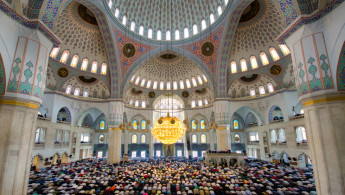What does Allahu Akbar mean and why do Muslims say it?
From happy occasions to sad ones, to protest and during mosque sermons, Muslims have long uttered the Arabic phrase "Allahu Akbar".
This week, the UK Conservative MP Robert Jenrick, who is running for leadership of the party, came under fierce criticism after he suggested that police must detain protesters chanting the phrase.
The comment was quickly condemned by Muslims and other MPs, who said it was "complete ignorance" and "textbook Islamophobia" by suggesting Muslims chanting it were extremists.
The Muslim Council of Britain (MCB) said they were shocked by the claim and urged the Conservative hopeful to apologise and retract his comments.
Afzal Khan, a Labour MP, said: "Another day, another senior Tory being Islamophobic," in response to the remark.
So what exactly do those two Arabic words mean?
Allahu Akbar, which translates to "God is Great", is a proclamation Muslims state before and during their five daily prayers.
It is sometimes said during other occasions, including weddings, religious supplications, and when seeing something awe-inspiring.
It is one of the first words Muslims hear, recited by parents into the ears of their newborn babies, and it can also be used to express gratitude or serve as a reminder of faith in times of hardship.
The expression is generally used to convey that even in times of hardship or happiness, God is present.
The phrase is repeated by Muslims during the pilgrimage of Hajj and during celebrations such as Eid too.
Does it have negative connotations?
For Muslims, the declaration is a positive one, with worshippers believing they are rewarded every time they utter it.
However, according to Imam Omar Suleiman, the founder and president of the Yaqeen Institute for Islamic Research, the media has manipulated the phrase to "serve a nefarious agenda: to instil fear of anyone who utters the phrase and to raise concerns even about Islamic itself".
There have been instances where the phrase was shouted before an attack, such as one where a white supremacist reportedly shouted it before opening fire and killing six Muslims at a mosque in Quebec City in Canada in 2017.
"But a lone terrorist who shouts 'Allahu Akbar' while murdering innocent people in the streets of New York does not get to own that term. Nor do those who declare that no further details are needed to determine motive once a man with a Muslim-sounding name perpetrates an attack using those words," Imam Suleiman wrote.
"We mustn’t allow terrorists or agendas of fear to own any of the words, concepts, or devotions found in the sacred text of a quarter of the world’s population. That would give them exactly what they want," he added.




 Follow the Middle East's top stories in English at The New Arab on Google News
Follow the Middle East's top stories in English at The New Arab on Google News

![A group of Palestinians, foreign and Israeli activists gather to participated in an olive picking event on the land in the town of Battir, which is under threat of confiscation by Israel in Bethlehem, occupied West Bank on 8 November 2024. [Getty]](/sites/default/files/styles/image_330x185/public/2182930803.jpeg?h=199d8c1f&itok=__0LgGsa)
